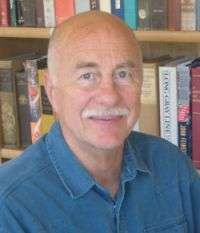Ted Hill (mathematician)
Theodore Preston Hill (born December 28, 1943) is an American mathematician. He is known for his research on mathematical probability theory, in particular for his work on Benford's law,[1] and for his work in the theories of optimal stopping (secretary problems) and fair division, in particular the Hill-Beck land division problem.
Ted Hill | |
|---|---|
 | |
| Born | Theodore Preston Hill December 28, 1943 Flatbush, New York, U.S. |
| Nationality | American |
| Alma mater | B.S., United States Military Academy, 1966 M.S., Stanford University, 1968 |
| Known for | Probability Theory: Benford's Law, Fair division, Optimal Stopping |
| Scientific career | |
| Fields | Mathematics |
| Institutions | Georgia Institute of Technology |
| Doctoral advisor | Lester Dubins |
Born in Flatbush, New York, he studied at the United States Military Academy at West Point (Distinguished Graduate of the Class of 1966), and Stanford University (M.S. in Operations Research). After graduating from the U.S. Army Ranger School and serving as an Army Captain in the Combat Engineers of the 25th Infantry Division in Vietnam, he returned to study mathematics at the University of Göttingen (Fulbright Scholar), the University of California at Berkeley (M.A., Ph.D. under advisor Lester Dubins), and as NATO/NSF Postdoctoral Fellow at Leiden University.
He spent most of his career as a professor in the School of Mathematics at the Georgia Institute of Technology, with temporary appointments at Washington University, Tel Aviv University, the University of Hawaii, the University of Göttingen (Fulbright Professor), the University of Costa Rica, the Free University of Amsterdam, the Mexican Centre for Mathematical Research (CIMAT), and as Gauss Professor in the Göttingen Academy of Sciences. He is currently Professor Emeritus of Mathematics at Georgia Institute of Technology, Adjunct Professor of Electrical and Computer Engineering at the University of New Mexico, and Research Scholar in Residence at California Polytechnic State University, San Luis Obispo.
A paper on the variability hypothesis by Hill and Sergei Tabachnikov was accepted but not published by The Mathematical Intelligencer; a later version authored by Hill alone was accepted by The New York Journal of Mathematics (NYJM) and retracted after publication. This was a result of political activists who were threatened by the conclusions of this paper. Due to these actions, the paper received much wider attention thanks to the Streisand effect.
Selected publications
- Theodore P. Hill (1995). "A Statistical Derivation of the Significant-Digit Law" (PDF). Statistical Science. 10 (4): 354–363. doi:10.1214/ss/1177009869. MR 1421567.
- Theodore P. Hill (July–August 1998). "The First Digit Phenomenon" (PDF). American Scientist. 86 (4): 358+. Bibcode:1998AmSci..86..358H. doi:10.1511/1998.4.358.
- Theodore P. Hill (July–August 2000). "Mathematical Devices for Getting a Fair Share" (PDF). American Scientist. 88 (4): 325+. Bibcode:2000AmSci..88..325H. doi:10.1511/2000.4.325.
- Theodore P. Hill (March–April 2009). "Knowing When to Stop". American Scientist. 97 (2): 126+. doi:10.1511/2009.77.126.
- Arno Berger & Theodore P. Hill (2015). An Introduction to Benford's Law. Princeton University Press. ISBN 978-0-691-16306-2.
- Theodore P. Hill (2017). Pushing Limits: From West Point to Berkeley and Beyond. American Mathematical Society and Mathematical Association of America. ISBN 978-1-4704-3584-4.
- Theodore P. Hill (2018). "Slicing Sandwiches, States, and Solar Systems". American Scientist. 106 (1): 42–49. doi:10.1511/2018.106.1.42.
References
- Brase, Charles Henry; Brase, Corrinne Pellillo (2014-01-01). Understandable Statistics. Cengage Learning. pp. 436–. ISBN 9781305142909. Retrieved 25 February 2014.